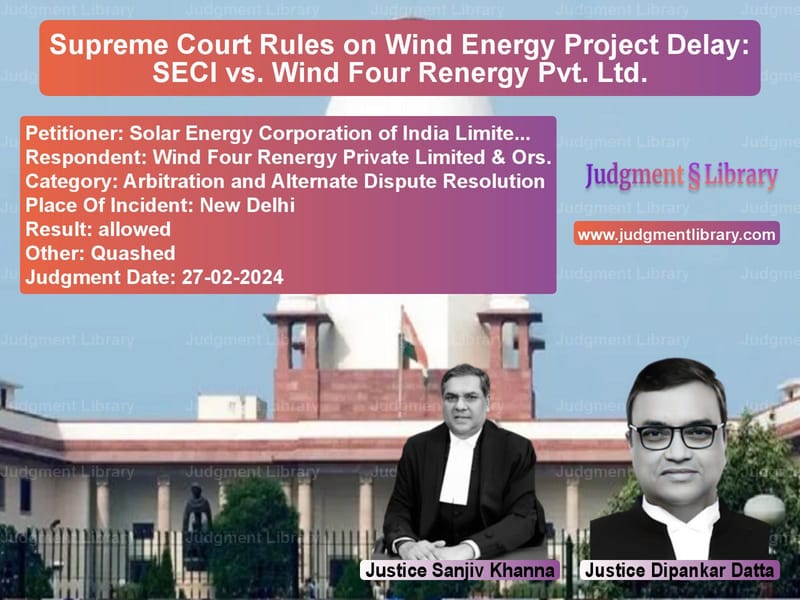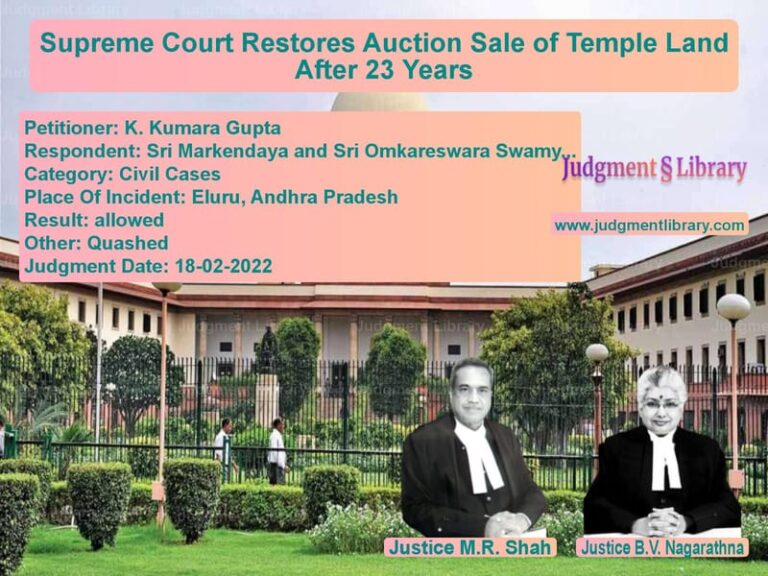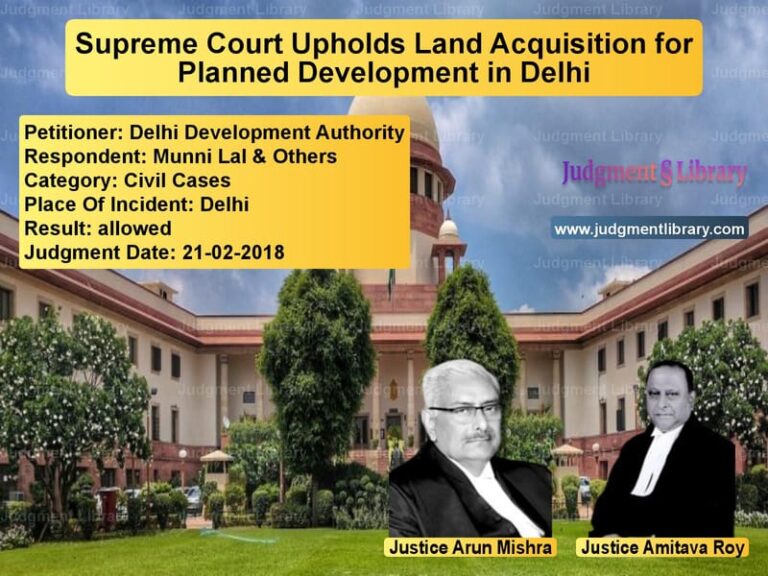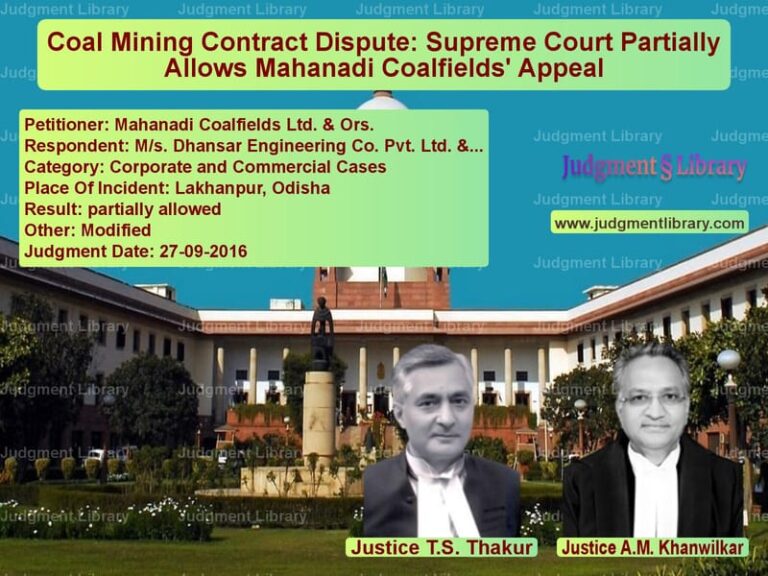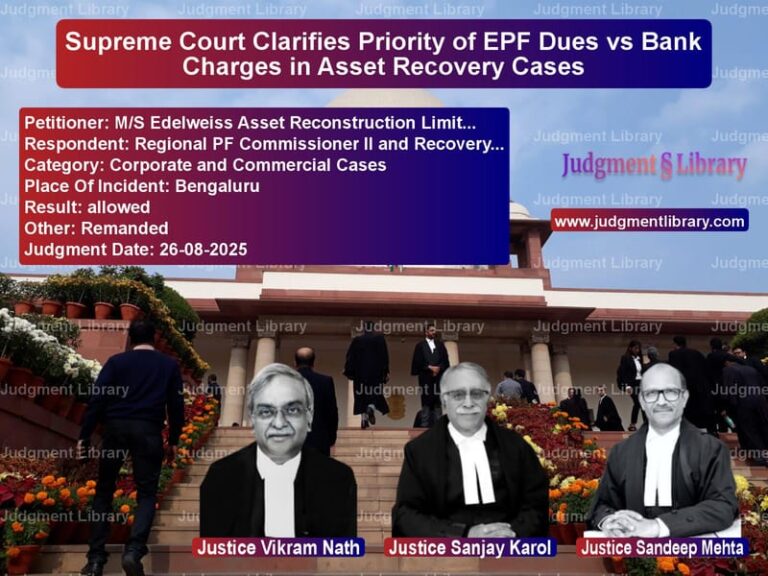Supreme Court Rules on Wind Energy Project Delay: SECI vs. Wind Four Renergy Pvt. Ltd.
The Supreme Court of India has delivered a critical judgment in the dispute between Solar Energy Corporation of India Limited (SECI) and Wind Four Renergy Private Limited (WFRPL), emphasizing the significance of adhering to contractual obligations in renewable energy projects. The case revolved around whether the delay in commissioning a wind energy project justified an extension beyond the agreed timeline and whether the Appellate Tribunal for Electricity (APTEL) erred in allowing additional time for commissioning beyond what was stipulated in the agreement.
This ruling reinforces the principle that energy sector contracts must be strictly enforced, particularly in infrastructure projects where delays can have substantial financial and regulatory implications.
Background of the Case
SECI, the government-owned nodal agency for renewable energy projects, had awarded a contract to WFRPL for the development of a 50 MW wind power project. The project was structured under a Power Purchase Agreement (PPA) dated July 21, 2017, under which WFRPL was required to complete the project within a specified period.
The timeline for the project’s completion was as follows:
- Scheduled Commercial Operation Date (SCOD): October 4, 2018
- Extended Deadline (with penalties): July 5, 2019
However, WFRPL faced delays, primarily due to issues with obtaining Long-Term Access (LTA) for power evacuation. LTA is a critical requirement in renewable energy projects, as it determines the infrastructure availability for transmitting generated power to the grid.
Although the LTA was operationalized on April 14, 2019, WFRPL claimed that it was not informed of the activation until November 22, 2019. As a result, WFRPL sought an additional extension beyond the agreed-upon deadline.
Regulatory and Legal Challenges
Faced with potential penalties and forfeiture of its bank guarantees, WFRPL approached the Central Electricity Regulatory Commission (CERC), seeking an extension of 132 days beyond the activation of LTA. CERC partially granted relief by revising the commissioning deadline to October 23, 2019, but refused to allow any further extensions.
SECI accepted the CERC ruling. However, WFRPL, dissatisfied with the limited relief, challenged the order before APTEL, which ruled in its favor and extended the commissioning deadline further, stating that the 132-day extension should be calculated from the date of APTEL’s judgment rather than from LTA activation.
SECI then appealed to the Supreme Court, arguing that APTEL’s ruling was contrary to contract law principles and would set a dangerous precedent by allowing indefinite delays in renewable energy projects.
Supreme Court’s Key Observations
The Supreme Court conducted an in-depth analysis of the project’s timeline and the regulatory framework governing renewable energy projects. It focused on the following key issues:
1. Whether WFRPL was justified in seeking additional time beyond the agreed deadline?
The Court ruled that WFRPL had prior knowledge of the LTA operationalization but failed to act promptly. It held that delays caused by administrative inefficiencies could not be used as grounds for extending project deadlines indefinitely.
2. Whether APTEL had the authority to grant additional extensions beyond the CERC ruling?
The Supreme Court found APTEL’s decision legally unsustainable, noting that it went beyond its jurisdiction by granting an extension that was not contemplated in the contract. The Court stated:
“APTEL’s decision to extend the commissioning period from the date of its judgment was irrational and contrary to the principles governing commercial contracts.”
3. The impact of delays on the renewable energy sector
The Court emphasized that allowing indefinite extensions in energy projects would negatively impact India’s renewable energy goals. It stated:
“Infrastructure projects, particularly in the renewable sector, require strict adherence to timelines. Any deviation affects not just commercial entities but also national energy targets.”
Final Judgment and Financial Implications
Based on its findings, the Supreme Court set aside APTEL’s ruling and reinstated CERC’s order. It held that:
- WFRPL must adhere to the commissioning deadlines set by CERC.
- APTEL exceeded its authority by granting an extension beyond contractual provisions.
- Renewable energy projects must comply with agreed schedules to ensure grid stability and regulatory certainty.
The Court further directed WFRPL to return Rs. 10 crores to SECI, which had been refunded under APTEL’s order. Additionally, SECI was granted the right to recover the amount with a 12% annual interest if not repaid within six months.
Legal and Industry Implications
The Supreme Court’s ruling has far-reaching implications for the renewable energy sector:
1. Enforceability of Contractual Timelines
This decision reinforces the importance of adhering to contractually agreed deadlines. Renewable energy developers can no longer assume that regulatory bodies will grant indefinite extensions.
2. Regulatory Certainty
The judgment establishes that sectoral regulators like CERC must be the final authority in determining project timelines, preventing appellate bodies from modifying their decisions arbitrarily.
3. Financial Accountability
The ruling ensures that project developers who fail to meet deadlines will face financial consequences, including forfeiture of bank guarantees and interest penalties.
4. Precedent for Future Cases
The judgment will likely serve as a benchmark for similar disputes in the renewable energy sector, preventing delays caused by project developers who seek extensions through litigation.
Conclusion
The Supreme Court’s decision in SECI vs. WFRPL underscores the importance of enforcing contractual obligations in infrastructure projects. By overturning APTEL’s decision, the Court reaffirmed that project delays must be justified based on legitimate reasons rather than administrative inefficiencies. This judgment will likely shape future regulatory decisions in the renewable energy sector, ensuring that India’s clean energy goals are met without unnecessary legal hurdles.
Petitioner Name: Solar Energy Corporation of India Limited (SECI).Respondent Name: Wind Four Renergy Private Limited & Ors..Judgment By: Justice Sanjiv Khanna, Justice Dipankar Datta.Place Of Incident: New Delhi.Judgment Date: 27-02-2024.
Don’t miss out on the full details! Download the complete judgment in PDF format below and gain valuable insights instantly!
Download Judgment: solar-energy-corpora-vs-wind-four-renergy-pr-supreme-court-of-india-judgment-dated-27-02-2024.pdf
Directly Download Judgment: Directly download this Judgment
See all petitions in Arbitration Awards
See all petitions in Enforcement of Awards
See all petitions in Dispute Resolution Mechanisms
See all petitions in Settlement Agreements
See all petitions in Arbitration Act
See all petitions in Judgment by Sanjiv Khanna
See all petitions in Judgment by Dipankar Datta
See all petitions in allowed
See all petitions in Quashed
See all petitions in supreme court of India judgments February 2024
See all petitions in 2024 judgments
See all posts in Arbitration and Alternate Dispute Resolution Category
See all allowed petitions in Arbitration and Alternate Dispute Resolution Category
See all Dismissed petitions in Arbitration and Alternate Dispute Resolution Category
See all partially allowed petitions in Arbitration and Alternate Dispute Resolution Category

